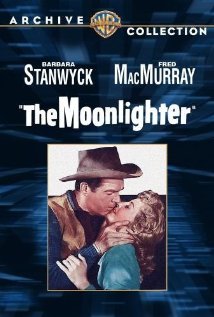
THE MOONLIGHTER
US, 1953, 77 minutes, Black and white.
Barbara Stanwyck, Fred Mac Murray, Ward Bond, William Ching, John Dierkes, Morris Ankrum, Jack Elam.
Directed by Roy Rowland.
The Moonlighter is a disappointing Western from 1953, especially with its strong stars who appeared together in the classic Double Indemnity as well and is There’s Always Tomorrow.
The film was directed by regular western drama director, Roy Rowland. It has a strong supporting cast.
The film opens interestingly with the prospect of a lynching, Fred Mac Murray in jail as a moonlighter, someone who has been rustling cattle at night. The lynch mob is self-righteous and, through a contrived situation, where an awkward man has been put in prison and objects to the dirt and proceeds to clean the prison, is mistakenly taken for Mac Murray and hanged.
Mac Murray escapes, pays for the funeral of the murdered man, lavishly for the town, while making a collection of money and possessions from those attending the wake.
In the meantime, Barbara Stanwyck as his former lover, appears to pay for the funeral but finds out what has happened. Mac Murray has been away from home for five years, suddenly returns, is a challenge to his brother, William Ching, who is in love with Barbara Stanwyck. He works at the bank but is fired.
The film then focuses on a bank robbery, a collaboration with Ward Bond who turns up and persuades Mac Murray to participate and the younger brother decides to be involved as well – much to the disgust of Barbara Stanwyck who has asked Mac Murray to look after his brother.
The robbery is successful but not the getaway and the film shows the brother being killed, Ward Bond turning against Mac Murray to take all the money, Barbara Stanwyck being deputised and confronting bonded shooting him, bringing Mac Murray back to justice but their having an accident at a waterfall and his rescuing her – with the promise to surrender to the authorities. Somewhat flat after the initial strong opening and the routine development.
It seems to be set in the horse era but, suddenly, a car appears at the time of the bank robbery. The film was filmed in 3 D – and the photography is clear.
1. A standard western, good beginning, slacker development, low-key ending?
2. The title, the rustling cattle, criminals, the law, lynching?
3. The western towns, the countryside, horses, the waterfall – and the sudden presence of the car? The musical score?
4. The opening, the lynch mob, Wes in prison, nonchalant, the black man singing, the prisoner, cleaning the cells, the guard running away? Getting the keys from the sheriff, the information about the cell, the wrong cell, lynching the wrong man, knocking out Wes? The graphic presentation of the lynching?
5. Wes, return, organising the funeral, collecting the money and possessions?
6. His returning home, the greeting from his mother? His relationship with his brother, wanting the brother to stay at home? His working the bank? Being fired?
7. Rela, previous love for Wes, going to marry Tommy? Her strong mindedness, memories of the past, getting Wes to promise to care for Tommy?
8. The robber turning up, suspicions in the bank, his plan for Wes, Tommy wanting in, Wes and his resistance?
9. The plan, the robbery, holding everyone up, taking the money, the shooting, Tommy’s death?
10. Wes and his accomplice, taking the car, the escape, the horses? The heart, the accomplice drinking, Wes cooking, the clash, Wes being tied up?
11. Rela, being deputised, knowing where Wes was, the confrontation with the accomplice and his death?
12. Freeing Wes, take him in, the waterfall and the accident, Wes rescuing her, his promise to give himself up? The sudden ending?